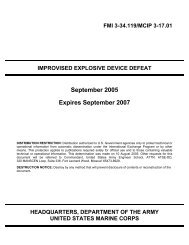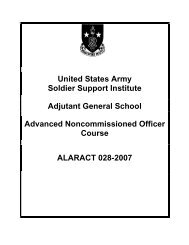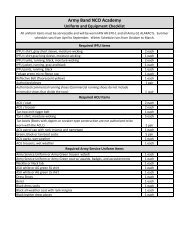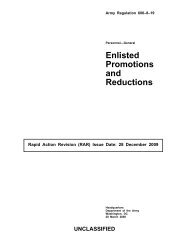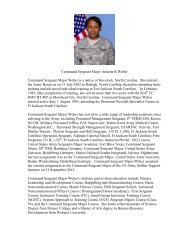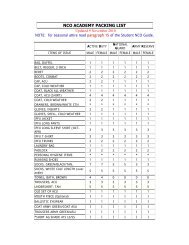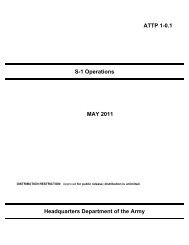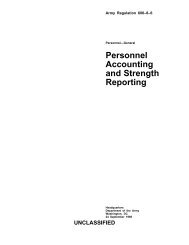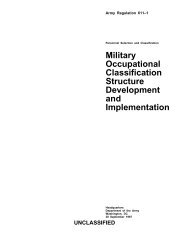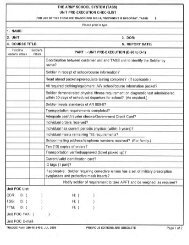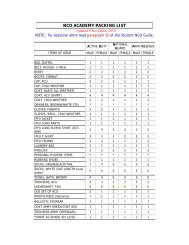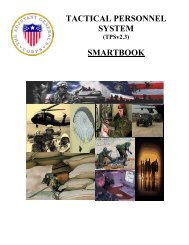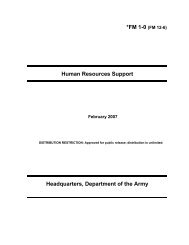NCOA Policy Letters - Soldier Support Institute - U.S. Army
NCOA Policy Letters - Soldier Support Institute - U.S. Army
NCOA Policy Letters - Soldier Support Institute - U.S. Army
- No tags were found...
You also want an ePaper? Increase the reach of your titles
YUMPU automatically turns print PDFs into web optimized ePapers that Google loves.
REPLY TOATTENTION OFDEPARTMENT OF THE ARMYUS ARMY SOLDIER SUPPORT INSTITUTENONCOMMISSIONED OFFICER ACADEMY2400 JACKSON BOULEVARDFORT JACKSON, SC 29207-7025ATSG-NC 23 July 2012MEMORANDUM FOR All NCO Academy Cadre and Student-NCOsSUBJECT: NCO Academy <strong>Policy</strong> Memorandum #29 - Suicide Prevention1. Reference, DA Pam 600-24, Health Promotion, Risk Reduction, and Suicide Prevention,17 Dec 09.2. Suicide is an irreversible decision that horrifically affects the individual's Family, friends,associates, and unit. This tragic and traumatic loss disrupts unit cohesion and weakens unitmorale. We can prevent this needless and tragic loss by learning to recognize suicide warningsigns and by taking immediate action to ensure that everyone exhibiting suicidal signs gets help.Suicide prevention is the responsibility of every <strong>Soldier</strong> and civilian working at the Academy.All military and civilian leaders must learn to recognize and respond to suicidal behavior.3. Commandant (DC) and First Sergeants (1SGs) are responsible for ensuring that suicideawareness and prevention training is conducted for all military/civilian personnel at leastannually, documenting that training in accordance with <strong>Army</strong> regulations. DC/1SGs should takefull advantage of emergent approaches to suicide prevention and training such as the <strong>Army</strong> ACE(Ask your buddy, Care for your buddy, Escort your buddy) Intervention program. Intensivetraining programs for selected unit personnel provide skills for early recognition and interventionof suicidal behavior, and can effectively multiply the Academy’s eyes and ears. Unit chaplainsand ministry teams also provide a great resource for leaders in recognizing potential suicidalbehaviors, as well as in leading/providing suicide prevention training.4. When recognizing that a <strong>Soldier</strong>, Family member, or civilian is showing signs or thoughts orbehaviors associated with suicide, the leader will promptly refer them to the servicing mentalhealthagency. Before taking this referral step, leaders should consult with their mental-healthprovider to ensure that their actions are consistent with appropriate policies. Once referred, theleader will ensure that the individual shows up for all scheduled appointments. The mental-healthagency treating the member will keep the leader informed of the status, as appropriate and withinthe limitations of the Privacy Act and licensing requirements for mental-health providers. Uponrelease from a physician's direct care, leaders in the member's chain of command must beparticularly attentive to their needs. This is a high risk period for the individual and requires thatleaders show compassion and understanding.



